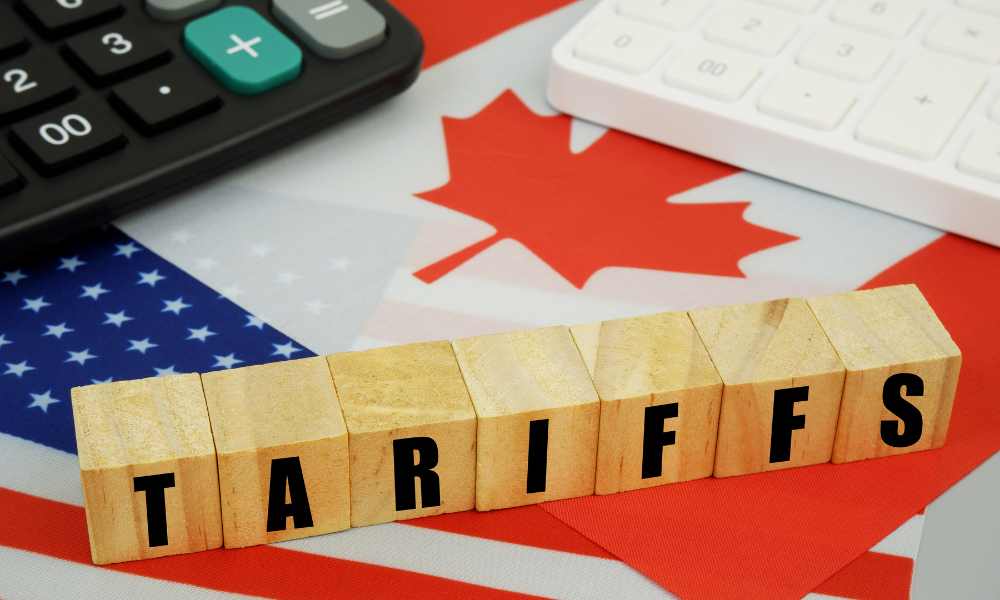Most Canadians back a tougher stance as Carney says zero-tariff deal with Trump looks unlikely

Canada may have to accept permanent tariffs on its exports to the United States, Prime Minister Mark Carney signalled Tuesday, as the window for a tariff-free trade deal appears to be closing ahead of a planned 35 percent duty hike by August 1.
According to Carney, there is “not much evidence at the moment — from the deals, agreements and negotiations with the Americans, for any country or any jurisdiction — to get a deal without tariffs.”
His comments, delivered in French ahead of a cabinet meeting in Ottawa, follow a letter from US President Donald Trump threatening to impose 35 percent tariffs on Canadian goods starting next month.
Carney’s admission marks the first time the federal government has publicly acknowledged that any future trade deal may include enduring tariffs, as reported by The Globe and Mail.
He said trade talks will “intensify” ahead of the August 1 deadline and emphasized that his government will focus on stabilizing affected sectors and strengthening the Canadian economy.
The sectors already impacted — steel, aluminum, autos — and those under threat — pharmaceuticals, lumber, copper — represent key industries tied to cross-border investment and supply chains.
Speaking to CBC News, Carney said, “there are obviously problems” with US sectoral tariffs and added, “we need to stabilize the situation for Canada.”
Those sector-specific duties fall under Section 232 of US trade law, allowing tariffs in the name of national security.
Catherine Cobden, president and CEO of the Canadian Steel Producers Association, told CBC that since Trump’s metals tariffs were introduced, Canadian steel production has dropped by 30 percent.
International trade lawyer William Pellerin told CTV News that Carney’s statements serve as “a bit of a wake-up call” for Canadian businesses.
He said that while most goods are CUSMA-compliant and therefore tariff-exempt, “certainly, right now, the steel industry and others are really suffering.”
Pellerin added that there is optimism about reaching a deal, but Carney’s remarks might be the “first time that we’ve really heard that we might not get there.”
According to The Globe and Mail, Carney noted Canada has among the lowest effective tariff rates globally due to high compliance with the Canada–US–Mexico Agreement.
The White House also confirmed to CBC that the 35 percent tariff would apply only to non-compliant exports.
Carney stated the government is focused on “a strong Canadian economy,” including “a strong Canadian auto industry, a strong Canadian aluminum industry, copper industry, and others.”
He reiterated that this includes continued discussion on building resilience in these sectors and ensuring Canada does not over-concede.
Pushback over that exact concern came swiftly.
Conservative Leader Pierre Poilievre called Carney’s remarks “another unilateral concession from a man who said he would never back down to the US president.”
Poilievre also criticized Carney’s earlier decision to drop the digital services tax — a US demand — to continue trade talks.
NDP interim leader Don Davies said, “Conceding to a bully never ends,” and urged the government to stop making concessions without securing reciprocal benefits.
Arlene Dickinson, a member of Carney’s Council on Canada–US Relations, told CBC that tariffs may be inevitable under Trump’s trade strategy but added there may be another opportunity to negotiate them down when CUSMA is reviewed in 2026.
“I can’t believe he’s going to allow no tariffs to occur because that’s just not his style,” she said, referring to Trump.
Speaking to CTV News, trade lawyer Lawrence Herman warned that free trade with the US may no longer be feasible, stating, “Trump’s policy is totally grounded in using tariffs and tariff threats to make deals.”
He also cautioned that the CUSMA renegotiations in 2026 may bring more instability, with the risk that Trump could walk away from the deal with six months' notice if Canada and Mexico do not accept unilateral changes.
According to The Globe and Mail, even countries that recently reached agreements with the US — such as the UK and Vietnam — still face baseline tariffs of 10 and 20 percent respectively.
Business Council of Canada president Goldy Hyder told the paper that Canada must now focus on negotiating the lowest possible tariff rate and seek exemptions.
“It’s become clear that free trade with United States is no longer free. It comes with a price of entry,” he said.
Michael Harvey of the Canadian Agri-Food Trade Alliance told The Globe and Mail that nearly all agri-food exports to the US are currently tariff-free and said Canada should not sacrifice this access for concessions in other sectors.
Meanwhile, a survey by the Angus Reid Institute shows 63 percent of Canadians support a “hard approach” to trade talks — meaning refusing difficult concessions even at the risk of worsened relations.
The remaining 37 percent support a “soft approach” that would maintain ties through compromise.
According to Angus Reid president Shachi Kurl, “there was already a significant amount of division” over whether Canadians believe Carney can secure a deal, even before Trump’s latest tariff threat.
As per the survey, 48 percent of respondents feel confident in a possible deal — either due to trust in Carney or a belief that Trump will back down — while 45 percent are not confident, citing either a lack of trust in Carney or Trump’s unpredictability.
“Those really represent an almost even division,” said Kurl.
Carney is expected to meet with premiers in Huntsville, Ontario, next week.
Trump has said that letters sent to Carney and other leaders outlining his tariff threats are the “deals,” telling reporters, “There are no deals to make.”
Trump has tied the 35 percent tariff threat to fentanyl enforcement and said Canada must do more to stem its flow across the border.



